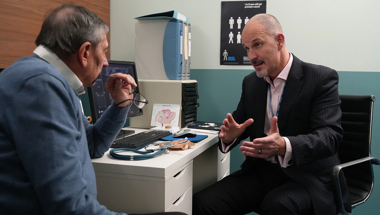Campaigns
11 Jun 2025Understanding the PSA blood test: your questions answered
Looking for answers about your prostate cancer risk? Asking your GP for a PSA blood test is a good place to start. To help you understand the test and what to do next, we’ve answered some of the most common questions we hear from men.

When it comes to prostate cancer, the earlier you find it the easier it is to treat. It’s not about luck or fate. It’s about knowing your risk. And taking control of today, so you can enjoy more tomorrows.
If you’re worried about your risk, you have a right to ask your GP for a PSA blood test to check for the early warning signs of prostate cancer. But how do you ask for one? And what should you do if your GP says no?
These are the sorts of questions we hear all the time. And that’s why we’ve answered them for you – so you can feel confident talking to your GP about the pros and cons of having a test.
How does the PSA blood test work?
It measures the amount of prostate specific antigen (PSA) in your blood. That’s a protein naturally produced by healthy prostate cells - although prostate cancer cells produce PSA too.
It’s normal to have a small amount of PSA in your blood. And as you get older, your PSA level is likely to rise naturally as your prostate gets bigger. A raised PSA level may suggest you have a problem with your prostate, but that doesn’t necessarily mean you have cancer.
A PSA blood test on its own can’t diagnose or rule out prostate cancer. But it’s the first step to see if you might benefit from having further tests, like an MRI scan.
When looking at your results, your GP will take into account a range of factors – including your age and general health as well as the size of your prostate, any symptoms you’re experiencing and any medication you’re taking.
When should I start getting PSA tests? And how often should I have them?
The first step is making an appointment with your GP or practice nurse. The PSA test isn’t suitable for everyone - and you should have the opportunity to talk through the pros and cons.
Prostate cancer mainly affects men over 50, and your risk increases as you get older. Your risk is even higher if you’re Black or if you have a family history of the disease.
So if you’re at higher risk, you may wish to speak to your GP about prostate cancer from the age of 45.
There’s no formal guidance on how often you should have a test. Some men ask to have one annually, but we suggest having a test every couple of years. Prostate cancer usually grows slowly – and if you haven’t been diagnosed and aren’t experiencing symptoms, there’s no evidence to suggest you need to have a test more frequently than this.

If I have a PSA test, does it mean I won’t need a rectal exam?
You don’t need to have a rectal exam to check for prostate cancer. You can choose to have a PSA blood test on its own.
A rectal exam is a very limited test for prostate cancer. That’s because the clinician can only feel the back wall of the prostate – so any abnormalities at the front or in the middle can be easily missed.
If you have symptoms, a rectal exam may be helpful – because it can indicate whether you might have a prostate problem that’s not related to cancer, or if your PSA level isn’t high enough for you to be referred. But it’s not an effective test for prostate cancer and you don’t have to have one.
What are my rights when it comes to getting a PSA test through the NHS?
You can ask for a free PSA test on the NHS right now.
Current NHS guidance is clear that, before having a test, you should be aware of your personal risk factors for prostate cancer and take the opportunity to discuss the pros and cons of the test with your GP.

What should I do if my GP refuses to give me a test?
A PSA test isn’t suitable for everyone, so your GP might say no when you ask for one.
It’s okay to ask why – and there may be a good reason. It might be because your general health means you wouldn’t be fit enough for treatment. Or that treatment wouldn’t help you live longer.
If you want to have a test and your GP still says no, you can try:
- speaking to another GP or practice nurse
- speaking to the practice manager at your GP surgery
- following the surgery’s complaints procedure or writing to the GP or practice manager to explain your complaint.
Can I get a test from somewhere else?
It’s best to ask your GP for a PSA test. But you might also see tests being offered in community centres or football stadiums.
If you’re thinking about having a PSA test at this type of event, make sure a doctor or nurse will be there. They can help you make an informed choice about testing and what the results might mean. Once you get your results, it’s best to discuss them with a healthcare professional.
PSA tests are also available to buy online. But these home tests might not be accurate or reliable. We’ve created further guidance on using home test kits to help answer any other questions you might have.
Finding prostate cancer earlier means more chances to live life on your terms. And it all starts with just 30 seconds of your time. That’s all it takes to check your risk of prostate cancer online.
And if you'd like to talk to someone about your prostate cancer risk and the PSA test, our Risk Information Service is here to help.






